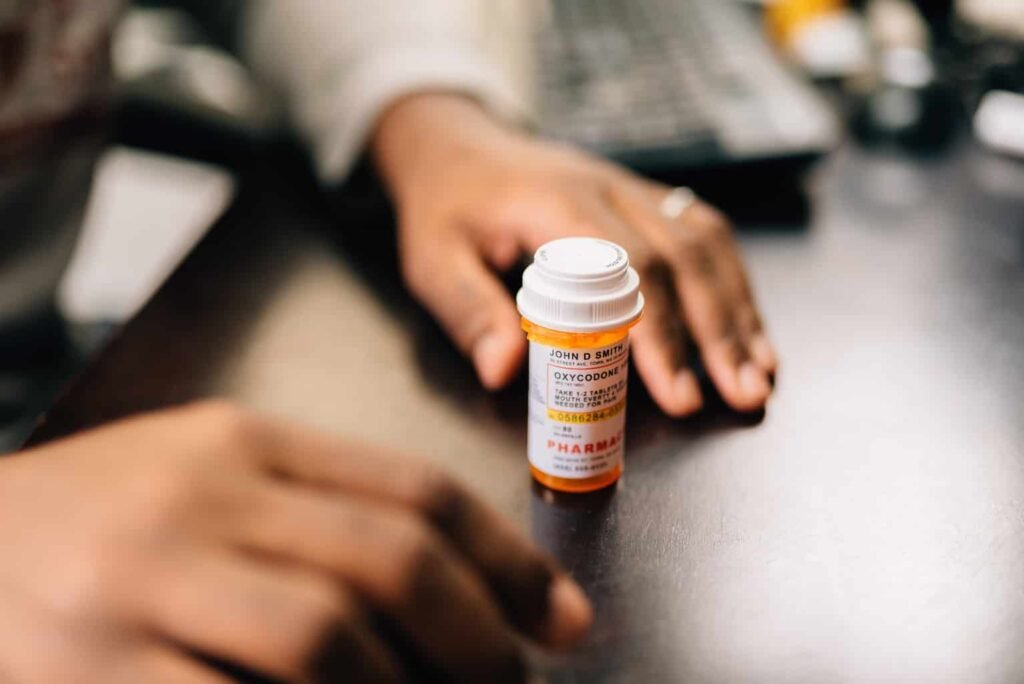Managing pain effectively often involves combining different medications to achieve better results. If you’ve been prescribed oxycodone or are considering over-the-counter options like ibuprofen for additional pain relief, you may be wondering: Can you take ibuprofen with oxycodone? The short answer is yes, but it’s important to understand how these medications interact, when it’s safe, and potential risks. This detailed guide will address everything you need to know.
What is Oxycodone?
Oxycodone is a powerful prescription opioid medication used to treat moderate to severe pain. It works by binding to opioid receptors in the brain and spinal cord, altering how your body perceives pain. Because of its potency and potential for addiction, it is typically reserved for serious pain management needs, such as post-surgical recovery or chronic conditions like cancer-related pain.
Common Forms of Oxycodone
- Immediate-release (IR): Provides fast-acting relief, lasting 4–6 hours.
- Extended-release (ER): Offers sustained pain relief over 12 hours or more.
- Combination Drugs: Medications like Percocet combine oxycodone with acetaminophen for additional pain relief.

What is Ibuprofen?
Ibuprofen is a nonsteroidal anti-inflammatory drug (NSAID) available over the counter (e.g., Advil, Motrin) or in prescription-strength formulations. It works by reducing inflammation, which helps alleviate pain, swelling, and fever. Ibuprofen is commonly used for conditions like arthritis, muscle pain, headaches, and minor injuries.
Key Benefits of Ibuprofen
- Reduces inflammation
- Provides pain relief
- Available without a prescription
Can You Take Ibuprofen with Oxycodone?
Yes, taking ibuprofen with oxycodone is generally safe and effective for managing pain. These two medications work in different ways, which allows them to complement each other:
- Oxycodone: Targets the central nervous system to block pain signals.
- Ibuprofen: Reduces inflammation and swelling at the source of the pain.
Because they have distinct mechanisms of action, combining them can offer more comprehensive pain relief than using either medication alone.
Benefits of Taking Ibuprofen with Oxycodone
1. Enhanced Pain Relief
Using ibuprofen with oxycodone provides a dual approach to pain management. Oxycodone works on the central nervous system, while ibuprofen reduces localized inflammation. This combination is particularly effective for conditions involving both severe pain and inflammation, such as post-surgical recovery or joint injuries.
2. Reduced Opioid Dosage
Combining oxycodone with ibuprofen may allow you to take a lower dose of oxycodone, reducing the risk of opioid-related side effects like drowsiness, constipation, or dependency.
3. Broader Pain Coverage
Ibuprofen can address pain and inflammation that oxycodone alone may not fully resolve, such as swelling or redness around an injury.

How to Safely Combine Ibuprofen and Oxycodone
While it’s generally safe to take these medications together, it’s important to follow these guidelines:
1. Consult Your Healthcare Provider
Always speak with your doctor or pharmacist before combining medications. They can provide personalized advice based on your health history, current medications, and pain management needs.
2. Follow Recommended Dosages
- Oxycodone: Take only the amount prescribed by your doctor, typically every 4-6 hours for immediate-release forms or every 12 hours for extended-release formulations.
- Ibuprofen: Stick to the recommended dose on the label (usually 200–400 mg every 4–6 hours) or as prescribed. Avoid exceeding 1,200 mg per day for over-the-counter use without medical supervision.
3. Space Out Doses if Needed
If taking both medications at the same time causes stomach upset or other issues, try staggering them. For example, take oxycodone first and ibuprofen a few hours later.
4. Avoid Long-Term Use Without Supervision
While short-term use of this combination is generally safe, prolonged use of ibuprofen can lead to gastrointestinal issues or kidney damage, while oxycodone carries a risk of dependency.
Risks and Side Effects
Combining ibuprofen and oxycodone is not without potential risks. It’s essential to be aware of possible side effects and take steps to minimize them.
1. Gastrointestinal Issues
Ibuprofen can irritate the stomach lining, leading to side effects such as:
- Stomach pain
- Heartburn
- Ulcers or bleeding (with long-term use)
Taking ibuprofen with food can help reduce the risk of stomach upset.

2. Opioid Side Effects
Oxycodone can cause:
- Drowsiness
- Constipation
- Nausea
- Respiratory depression (with high doses)
Combining oxycodone with ibuprofen generally doesn’t increase these risks, but always monitor for any adverse reactions.
3. Allergic Reactions
Some individuals may be allergic to either ibuprofen or oxycodone. Signs of an allergic reaction include:
- Rash or hives
- Swelling of the face or throat
- Difficulty breathing
Seek immediate medical attention if these symptoms occur.
4. Drug Interactions
Be cautious if you’re taking other medications, especially:
- Blood thinners (e.g., warfarin)
- Other NSAIDs (e.g., aspirin, naproxen)
- CNS depressants (e.g., alcohol, benzodiazepines)
These combinations can increase the risk of bleeding, sedation, or other complications.
When Should You Avoid Combining Ibuprofen and Oxycodone?
In some cases, combining ibuprofen with oxycodone may not be safe. Avoid this combination if:
- You have a history of stomach ulcers or gastrointestinal bleeding.
- You have kidney disease or reduced kidney function.
- You are taking other medications that interact with ibuprofen or oxycodone.
- You are pregnant, especially during the third trimester (ibuprofen may harm the developing fetus).
Always consult your healthcare provider if you have concerns.
Alternatives to Ibuprofen and Oxycodone
If combining ibuprofen and oxycodone isn’t suitable for you, there are other pain management options:
1. Acetaminophen (Tylenol)
Often combined with oxycodone in prescription medications like Percocet, acetaminophen is another over-the-counter option for pain relief without the anti-inflammatory effects of ibuprofen.
2. Physical Therapy
For chronic pain conditions, physical therapy can help address the root cause of pain and reduce reliance on medications.
3. Topical Pain Relievers
Creams or patches containing menthol, capsaicin, or lidocaine can provide localized relief without systemic side effects.
4. Prescription NSAIDs
If over-the-counter ibuprofen isn’t sufficient, your doctor may recommend a prescription-strength NSAID.

Tips for Effective Pain Management
To maximize pain relief and minimize risks, follow these tips:
- Stay Hydrated: Drinking plenty of water can help prevent side effects like constipation (common with oxycodone) and kidney issues (linked to ibuprofen).
- Take Medications with Food: This reduces the risk of stomach irritation, especially with ibuprofen.
- Avoid Alcohol: Alcohol can worsen side effects like drowsiness and increase the risk of stomach bleeding.
- Track Your Pain Levels: Keeping a pain diary can help your doctor adjust your treatment plan as needed.
Conclusion
Taking ibuprofen with oxycodone can be a safe and effective way to manage pain when used correctly. The combination addresses both inflammation and severe pain, offering a well-rounded approach to pain relief. However, always consult your healthcare provider before combining medications to ensure it’s the right choice for your specific needs. By following recommended dosages and monitoring for side effects, you can safely manage pain and improve your quality of life.
1. Can I take ibuprofen and oxycodone together on an empty stomach?
It’s better to take ibuprofen with food to minimize stomach irritation. Oxycodone can generally be taken with or without food, depending on your tolerance.
2. How long should I wait between doses of ibuprofen and oxycodone?
You can take them at the same time or space them out if needed. Always follow the dosing instructions provided by your healthcare provider.
3. Can I take ibuprofen with oxycodone if I’m already taking other medications?
It depends on the medications. Always consult your doctor or pharmacist to avoid harmful drug interactions.
